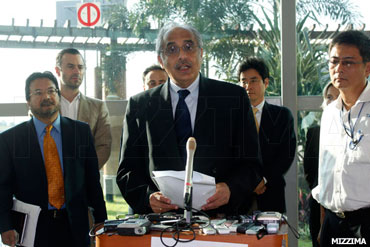The special adviser to the U.N. secretary-general told Burmese officials on Sunday that more support for health and education programs is crucial for sustained development in Burma.

During a development conference in Naypyitaw, Vijay Nambiar told government officials and expert panelists that health and education are vital to human fulfillment and dignity.
“They are crucial for fuelling innovation and growth,” he said. “Investing in people is therefore not an option – it is a precondition for any government to deliver on society’s needs and to compete in today’s economy.”
Many countries in the region, including Burma, are facing “a youth bulge,” he said. “If well managed, investing in youth can yield great dividends for building a sound political and economic system… . But if action to meet their needs and aspirations is not taken urgently, prospects for social peace and economic prosperity may suffer.” He said development is not sustainable “unless it is equitable.”
“In Burma, this entails equal access for all peoples in both central and border regions. Investment in development is also the best prevention against social strife,” he said. “Both state and society therefore have a stake in improving living standards as necessary conditions for the country’s unity and progress.”
He noted that during the past year since President Thein Sein’s began a series of reforms that great progress has been made in many areas, but three ingredients are now needed to keep reforms on track: participation by a wide cross-section of the public; partnership with the private sector, civil society and academia; and working with regional and international bodies, including the U.N.
“An engaged society can help the government improve policy-making, reflect the people’s legitimate interests and – as the President has noted – help ‘guarantee fundamental rights of citizens” in the process,” Nambiar said.
Citing various U.N. human development programs, he said, “It is possible to multiply national efforts in a way that would not be achievable without such partnerships. Combining the UN’s convening authority and technical resources with the various strengths of government, business and civil society, can be a formidable force for good.”
Nambiar said this is the moment for Burma “to make use of the U.N.’s unique services – from facilitation and technical assistance to capacity-building and policy advice – in the political, humanitarian and development spheres. Solidarity also depends on resources.”
A tight budget and the current economic crisis is no excuse for inaction, he said, and “Better national budget allocations and coordinated donor support can make a significant difference.”
“The government’s new budget plan to reorient and increase spending to health and education is both necessary and welcome,” he said. “No government can afford to shy away from such responsibilities. The budgetary priorities and allocations made by the government and Parliament will be an early test of Burma’s commitment to reform.”
He urged government officials to implement reforms in health and education “to serve its people better and build the economic conditions for durable peace and stability.”


